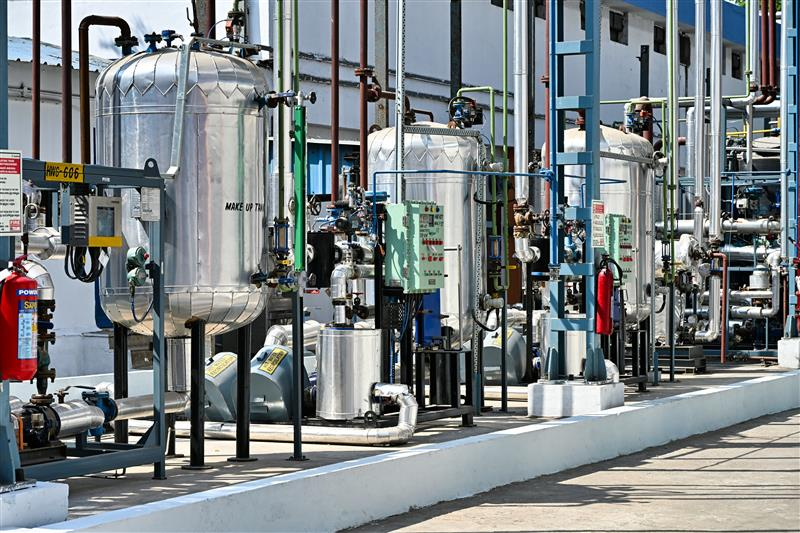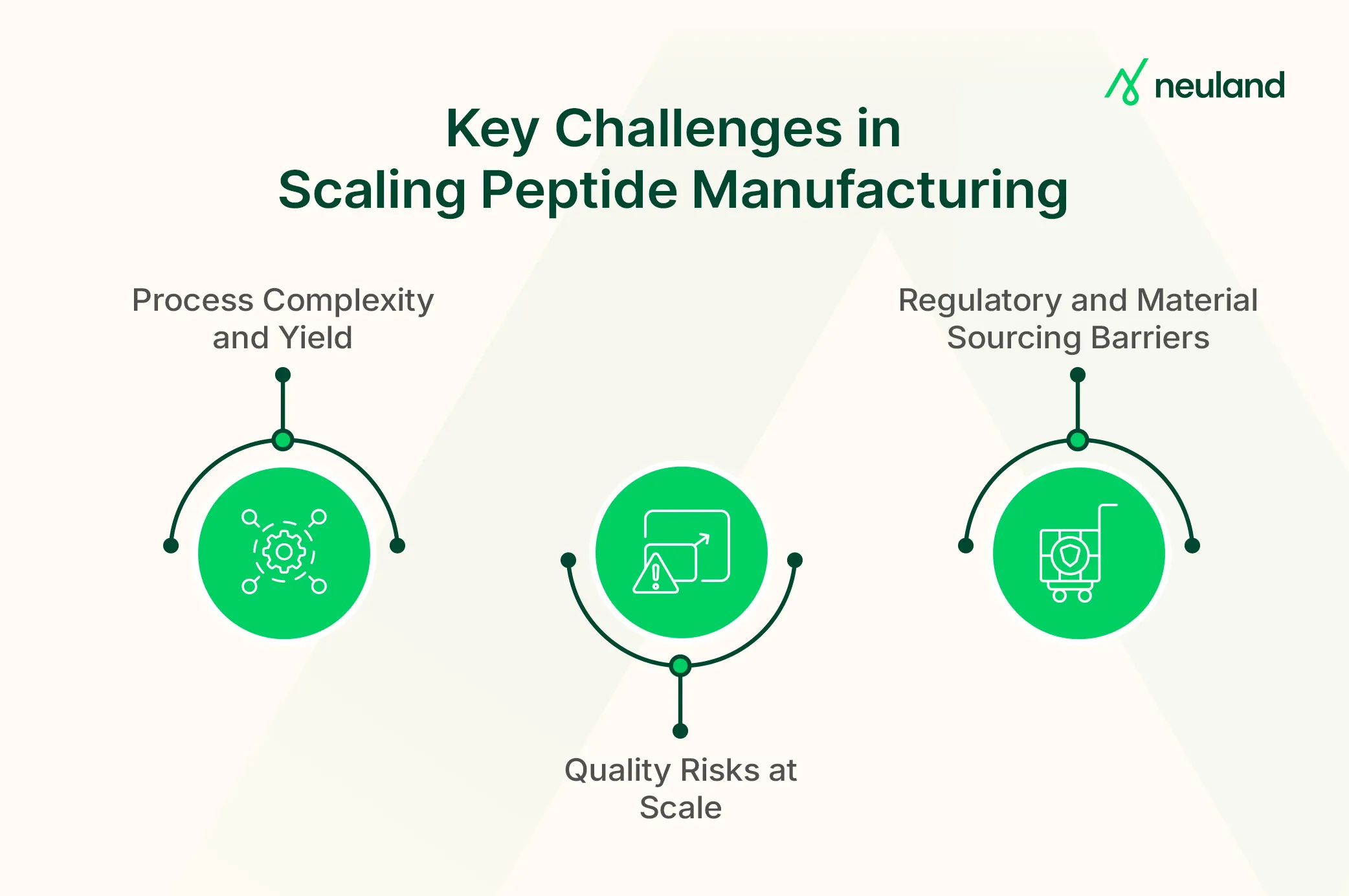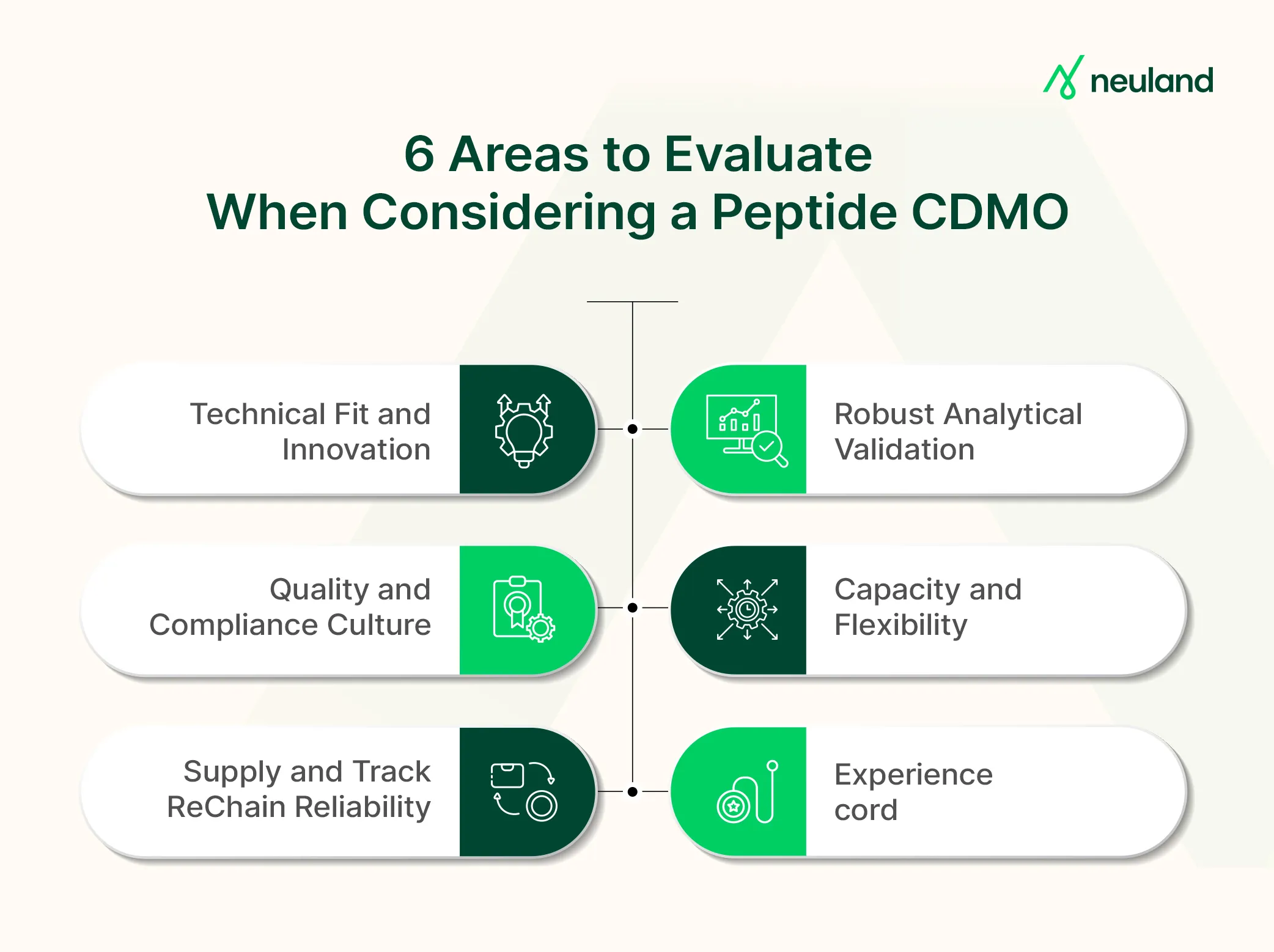Peptide Manufacturing at Commercial Scale: What to Expect from a Trusted CDMO Partner

Peptide-based therapeutics are seeing unprecedented growth, from cancer treatments to metabolic disease drugs. Glucagon-like peptide-1 (GLP-1) analogs for type 2 diabetes and obesity, for example, have dramatically increased demand for peptide drug substance.
Companies advancing peptide candidates to late-stage trials or commercialization face a critical challenge: scaling up peptide manufacturing to meet large-volume needs while maintaining quality and compliance.
This is no small feat, and it’s why many turn to specialized Contract Development and Manufacturing Organizations (CDMOs) as strategic partners.
Let’s examine the challenges of scaling peptide production and outline what an expert CDMO partner should bring to the table for a successful collaboration.
Why Scaling Peptide Manufacturing Is Challenging
Unlike small molecules, synthetic peptides are produced via sequential assembly of dozens of amino acids.

Process Complexity and Yield
Each iterative coupling can produce truncated sequences or impurities, which accumulate exponentially with peptide length, limiting practical synthesis to around 50–70 amino acids.
Achieving high yield and purity becomes difficult for longer peptides; even slight variations in reaction conditions or reagent quality at scale can compromise the final product.
Quality at Scale
Impurities that are minor at milligram scale may become significant at multi-kilogram scale if not rigorously controlled.
Peptide aggregation is a persistent issue. Aggregates or misfolded forms can also pose safety risks, so they must be detected and minimized. Controlling such issues at larger scale requires careful optimization of solvents, resin selection, mixing, and temperature to prevent localized high concentrations that trigger aggregation.
Furthermore, purification and filtration steps must be scaled or re-evaluated, as large-scale peptide production often requires advanced methods like preparative high-performance liquid chromatography or continuous chromatography to attain therapeutic-grade purity.
Regulatory and Supply Considerations
As production transitions to Good Manufacturing Practice (GMP) grade custom peptide synthesis, the peptide manufacturing process must be validated and documented. Any inconsistency can lead to costly delays or even regulatory rejection.
Another often overlooked challenge is the supply chain for raw materials. Commercial-scale peptide synthesis consumes large quantities of protected amino acids, coupling reagents, solvents, and resin.
The Role of a CDMO Partner in Peptide Scale-Up
For peptides in particular, the rationale for outsourcing is strong: companies can access specialized expertise and infrastructure without incurring the massive capital investment of building it in-house.
Peptide CDMOs offer end-to-end services including process development, analytical characterization, scale-up in GMP conditions, and quality control, catering to both clinical trial material and commercial API supply.
They also bring institutional knowledge of what works (and what doesn’t) for scaling peptides. For example, how to tweak a solid-phase protocol to improve coupling efficiency at kilo-scale, or how to adjust cleavage conditions to prevent aggregation.
Crucially, a peptide CDMO provides flexible manufacturing capacity. Early on, only gram quantities may be needed for toxicology or Phase 1 studies, but later the requirement could escalate to multi-kilogram batches for Phase 3 or market launch.
Must-Have Capabilities of a Peptide CDMO Partner
When selecting a CDMO for peptide manufacturing, certain core capabilities and qualities are essential. Below are key attributes and services an expert peptide CDMO partner should offer:

Advanced Peptide Synthesis Technology
This includes state-of-the-art solid-phase peptide synthesis equipment for high-throughput sequential assembly, as well as expertise in solution-phase peptide synthesis and hybrid approaches.
Leading peptide CDMOs can seamlessly combine SPPS and solution-phase steps (fragment condensation) to handle very long or complex peptides more efficiently.
The availability of hybrid strategies is a differentiator – it allows segments of a peptide to be made separately (via SPPS) and then chemically ligated in solution, improving yields for large peptides.
Additionally, the peptide CDMO should be capable of making custom modifications to peptides, e.g., cyclic peptides, PEGylated peptides, stapled or conjugated peptides, unusual amino acids, etc.
Analytical Validation & Quality Control
Comprehensive analytical capabilities are non-negotiable in peptide manufacturing.
A top CDMO will have modern labs with expertise in peptide-specific methods like HPLC and ultra-performance LC for purity, mass spectrometry for molecular weight and sequence, and techniques to detect aggregation or structural issues.
During scale-up, the CDMO should be adept at developing tailored analytical methods and specifications that will ensure quality at scale. Monitoring critical quality attributes (like sequence fidelity, impurity profile, and peptide conformation) is essential.
If a peptide has chirality concerns or requires a specific fold, the CDMO must have assays to verify these structures for every batch. High-purity production is a hallmark of a capable peptide CDMO, meaning they can routinely achieve the >98% purity often needed for therapeutic peptides.
GMP Compliance and Regulatory Expertise
Any CDMO under consideration must have proven cGMP manufacturing facilities and a solid quality compliance record. This includes having appropriate certifications and a quality system that handles change control, deviations, and documentation rigorously.
Peptide therapeutics must meet the same high regulatory standards as any drug, so the CDMO should be well-versed in preparing CMC documentation for regulatory filings.
A peptide manufacturing partner with experience authoring Drug Master Files (DMFs) for peptides or contributing to NDAs/MAAs will know how to compile process descriptions, validation reports, and impurity justifications in line with guidelines.
Scalability and Flexible Capacity
Many leading CDMOs are currently expanding capacity in response to peptide pipeline growth. Some have installed large-volume SPPS reactors and multi-column purification systems to produce peptide APIs in the hundreds of kilograms annually.
While your project may not require that scale, it’s reassuring to know the partner isn’t likely to hit a capacity ceiling if your peptide becomes very successful. Additionally, confirm the CDMO’s downstream capacity:
- Do they have large freeze-dryers (lyophilizers) for peptide drying?
- Do they have sufficient cold storage and warehousing?
- Do they have solvent handling systems for large volumes?
An often-cited concern is whether a CDMO can supply not just initial market needs but also ramp up further post-launch or adapt to surge demands. Flexible capacity also means the CDMO is willing to invest or allocate resources to grow with your program.
Supply Chain Reliability
A dependable peptide manufacturing partner must manage a stable supply chain for peptide inputs, like Fmoc/tBoc amino acids, linkers, resins, and reagents. Ask about risk mitigation:
- Do they dual-source key materials?
- Do they have backup suppliers for exotic amino acids?
Given recent global disruptions, a CDMO that avoids geographic over-reliance and maintains safety stocks or rapid logistics is ideal.
Reliability also includes operational consistency, low batch failure rates, strong project management, and on-time delivery. Look for SLAs that outline contingency plans and delivery metrics.
Experience and Track Record
Peptide manufacturing demands not just specialized, but industry expertise. The right CDMO should have a strong peptide track record, measured by the number of GMP peptide APIs produced, late-stage launches supported, and overall years in peptide services.
Ask how many peptide projects they’ve handled and whether they’ve scaled similar sequences. Tangible indicators like dedicated peptide teams, case studies, or client references offer insight into experience and reliability.
Partnering with the Right CDMO for Peptide Manufacturing Success
The stakes are high, patients are waiting for these innovative therapies, so selecting a partner with proven capabilities and trustworthiness is essential.
Neuland has emerged as a leading peptide manufacturing partner, backed by decades of chemistry expertise and a global footprint. The company has built an integrated peptide synthesis platform with solid-phase, liquid-phase, and hybrid synthesis technologies to handle diverse and complex peptides.
It recently announced a dedicated peptide manufacturing facility with advanced automation and an initial capacity of tens of kilograms per year, scalable to over 100 kg annually.
Equally important, Neuland brings a strong track record of quality and compliance, their team of 50+ peptide scientists and robust GMP infrastructure have supported projects from early development through generic API supply.
By choosing a CDMO partner with the right mix of expertise, operational excellence , and credibility, companies can navigate the path to commercial peptide manufacturing more smoothly.
FAQs
|
|
|
|